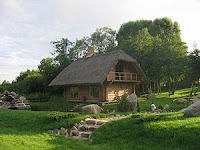Environmental, economic and social well-being for today and tomorrow. Sustainable development has been defined in many ways, but the most frequently quoted definition is from Our Common Future, also known as the Brundtland Report:[1] "Sustainable development is development that meets the needs of the present without compromising the ability of future generations to meet their own needs. It contains within it two key concepts:the concept of needs, in particular the essential needs of the world's poor, to which overriding priority should be given; and the idea of limitations imposed by the state of technology and social organization on the environment's ability to meet present and future needs."
All definitions of sustainable development require that we see the world as a system—a system that connects space; and a system that connects time.
From the Philippine perspective sustainable development is a multidimensional concept, involving no less than seven dimensions. Sustainable development is viewed as the mutually beneficial interaction between the legitimate interests of business and the economy, government and the polity, and civil society and culture. However, these societal interactions do not exist in a vacuum. On the physical and material side, society is bounded by the carrying capacity of the varied ecosystems, landscape ecology, and ultimately the biosphere of the earth, of Nature. On the psychological and spiritual side, the threefold functional differentiation of society is contextualized by the caring capacity of individuals.
SUSTAINABLE DEVELOPMENT is a pattern of resource use, that aims to meet the human needs while preserving the environment so that these needs can be met not only on the present, but also for generations to come. It ties together concerns for the carrying capacity of natural systems with the social challenges facing humanity. The field of sustainable development can be conceptually broken into three constituent parts:
1. ENVIRONMENTAL SUSTAINABILITY is the process of making some current processes of interaction with the environment, pursued with the idea of keeping the environment as pristine as naturally possible based on ideal-seeking behavior.
2. ECONOMIC SUSTAINABILITY is the term used to identify various strategies that make it possible to utilize available resources to best advantage. The idea is to promote usage of those resources that is both efficient and responsible, and likely to provide long-tem benefits. In the case of a business operation, economic sustainability calls for using resources so that the business continues to function over a number of years, while consistently returning a profit.
3. SOCIOPOLITICAL SUSTAINABILITY is very much concerned with physical and material standing of peoples, but further than this it is concerned with the state of their civil society. Social-political sustainability is differentiated from pure social development in that its sphere is expanded beyond the employment of simply monetary means. Social-political development entails not only the engagement of institutional mechanisms, but also their modification and advancement. Social-political sustainability thus seeks pathways to durable social enrichment and development via the vibrancy and health of a society’s political processes. At its core, there ultimately is little more than an absolute faith in the functioning of liberal democracy. Despite the frequent changing of the guard and the potential for policy discontinuity this entails, it is believed that representative republican government buttressed by mass public awareness and participation provides the best model for a sustainable body politic.
ACTIVITY:
4.http://www.alternativechannel.tv/blog/en/comments/social_political_sustainability_the_human_element/
5.//www.google.com.ph/#hl=tl&source=hp&q=pictures+regarding+sustainable+dveleopment&btnG=Hanapin+sa+Google&oq=pictures+regarding+sustainable+dveleopment&aq=f&aqi=&aql=f&gs_sm=s&gs_upl=1953l12469l0l42l31l0l14l0l5l713l8043l3-5.6.5.1l17&fp=bb33f62dd8b5a9e5&biw=1366&bih=583





